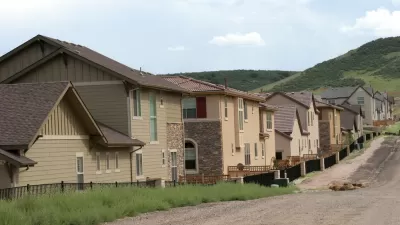This Labor Day weekend, Southern California is facing an extreme heat wave, with temperatures soaring well above 100 degrees. Air conditioners have to work overtime to keep indoor temperatures near 80, and California power resources are operating at near capacity. As condominiums bake in the sun (as they do most of the year around here), there is not a solar panel in sight. While we are still waiting for renewable energy, a few simple measures could lead to big residential power savings. Enter the laundry line, one of the oldest and most practical ways to use solar energy. Electric clothes dryers not only require vast amounts of fossil fuel-derived power, they also pour heat into living spaces and strain cooling systems.
This Labor Day weekend, Southern California is facing an extreme heat wave, with temperatures soaring well above 100 degrees. Air conditioners have to work overtime to keep indoor temperatures near 80, and California power resources are operating at near capacity. As condominiums bake in the sun (as they do most of the year around here), there is not a solar panel in sight.
While we are still waiting for renewable energy, a few simple measures could lead to big residential power savings. Enter the laundry line, one of the oldest and most practical ways to use solar energy. Electric clothes dryers not only require vast amounts of fossil fuel-derived power, they also pour heat into living spaces and strain cooling systems.
Yet hanging laundry outdoors is strictly forbidden in most Southern California apartment and condo complexes for cosmetic reasons; a beach towel over the balcony could even warrant a call from the building manager. In Europe, outdoor clotheslines are a common sight, particularly in warm Mediterranean countries. Colorful laundry lines enhance the charm of small towns and city streets, and are often photographed by tourists.
Ironically, many of the new high density residential developments in California display flamboyant Mediterranean design motifs – red tile roofs, white stucco, floral archways, and courtyard fountains. Wouldn't real clotheslines bring some authenticity to these developments, which are sometimes criticized for their theme-park style?
The clothesline issue has picked up steam in recent months. There is a nonprofit organization, Project Laundry List, that combats local housing rules that forbid line drying. Leading a national Right To Dry movement, the group recently celebrated the passage of a Florida state law granting property owners the right to use clotheslines. In April, the New York Times promoted the laundry line as a simple solution to global warming: "If all Americans line-dried for just half a year, it would save 3.3% of the country's total residential output of carbon dioxide". And just last week, the Associated Press featured a photographic journey through Portugal via the country's everpresent hanging laundry. California apartment managers should take note -- it doesn't look so bad!

Planetizen Federal Action Tracker
A weekly monitor of how Trump’s orders and actions are impacting planners and planning in America.

Map: Where Senate Republicans Want to Sell Your Public Lands
For public land advocates, the Senate Republicans’ proposal to sell millions of acres of public land in the West is “the biggest fight of their careers.”

Restaurant Patios Were a Pandemic Win — Why Were They so Hard to Keep?
Social distancing requirements and changes in travel patterns prompted cities to pilot new uses for street and sidewalk space. Then it got complicated.

Platform Pilsner: Vancouver Transit Agency Releases... a Beer?
TransLink will receive a portion of every sale of the four-pack.

Toronto Weighs Cheaper Transit, Parking Hikes for Major Events
Special event rates would take effect during large festivals, sports games and concerts to ‘discourage driving, manage congestion and free up space for transit.”

Berlin to Consider Car-Free Zone Larger Than Manhattan
The area bound by the 22-mile Ringbahn would still allow 12 uses of a private automobile per year per person, and several other exemptions.
Urban Design for Planners 1: Software Tools
This six-course series explores essential urban design concepts using open source software and equips planners with the tools they need to participate fully in the urban design process.
Planning for Universal Design
Learn the tools for implementing Universal Design in planning regulations.
Heyer Gruel & Associates PA
JM Goldson LLC
Custer County Colorado
City of Camden Redevelopment Agency
City of Astoria
Transportation Research & Education Center (TREC) at Portland State University
Camden Redevelopment Agency
City of Claremont
Municipality of Princeton (NJ)




























